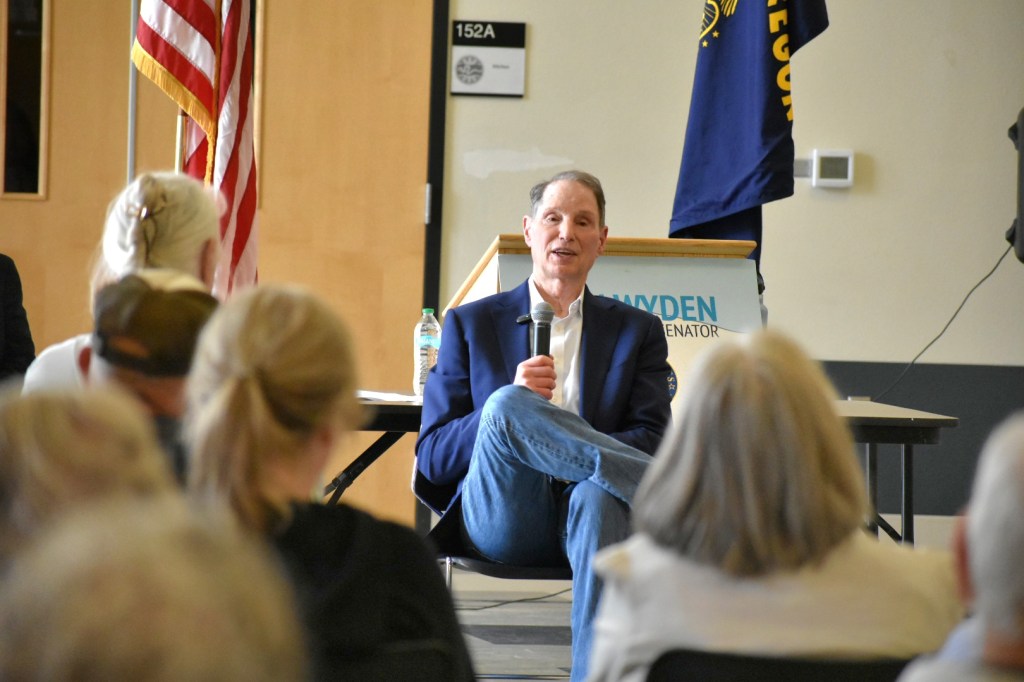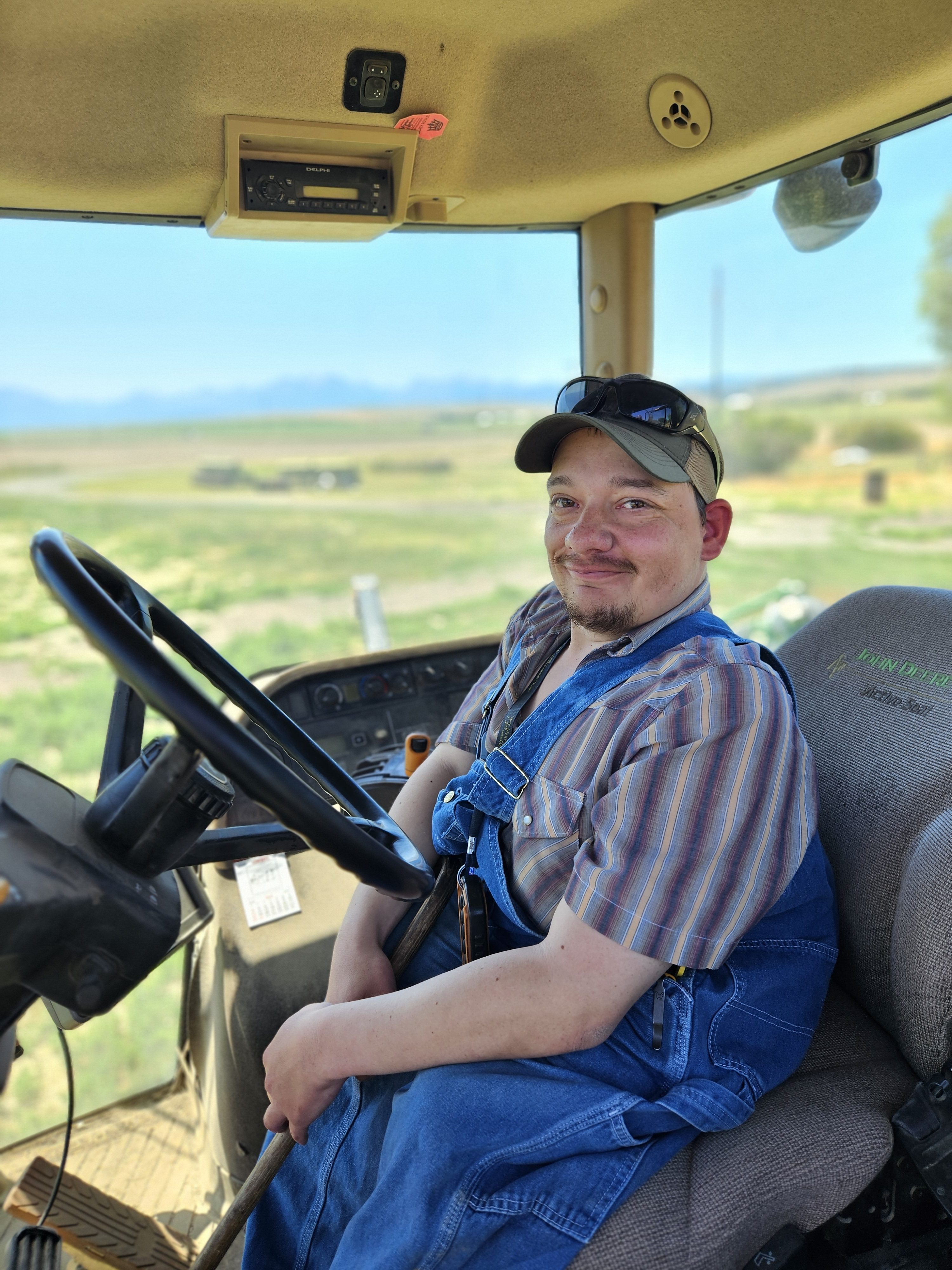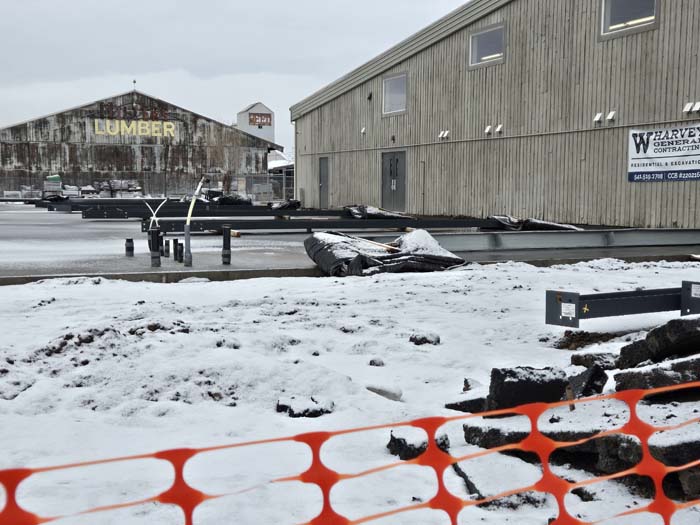U.S. Sen. Ron Wyden talks taxes, Medicare and Medicaid, proposal to sell public lands during Baker City town hall
Published 1:10 pm Friday, June 20, 2025

- U.S. Senator Ron Wyden speaks to an audience during a town hall in Baker City on June 20, 2025. (Lisa Britton/Baker City Herald)
U.S. Sen. Ron Wyden was in Baker City on Friday, June 20, for a public town hall at the Baker City Armory.
Wyden, a Democrat, is Oregon’s senior senator, having been in office since 1996. He was re-elected to a six-year term in November 2022.
Wyden was introduced by Shane Alderson, chairman of the Baker County Board of Commissioners.
Trending
“He considers himself the senator who listens, and so do I,” Alderson said, acknowledging that his political stances don’t always coincide with Wyden’s. “He’s been a tremendous support for Baker County.”
Wyden’s opening comments
“There are no subjects off limits,” Wyden told the audience of about 120.
“No kings and no violence,” Wyden said, summing up his position about the current state of affairs in the country.
“There are tremendous concerns about the rule of law, and protecting everyone’s rights,” Wyden said.
He said he has been having conversations with officials at Saint Alphonsus Medical Center-Baker, which closed the intensive care unit and birthing center at the Baker City hospital in 2023.
Trending
Wyden also cited work by the U.S. Forest Service locally, notably a project slated to start soon to reduce the fire danger in Baker City’s watershed. Wyden invited Shaun McKinney, supervisor of the Wallowa-Whitman National Forest, to talk about the watershed project, which includes commercial and noncommercial logging and prescribed burning.
McKinney said the Forest Service is working on contracts to start noncommercial fuels reduction work.
“We’ll be able to truly safeguard our water for everybody,” he said.
Wyden said he recently introduced legislation related to prescribed burning on federal forests. He said officials from the Trump administration have endorsed the proposal, too.
“This is going to be a tough summer,” Wyden said, citing recent wildfires, including one that destroyed dozens of homes near The Dalles.
Audience questions
The first question was related to the federal budget, and specifically a proposal to potentially sell parcels of public land.
Wyden said he is “very much opposed to this,” calling it a “colossally bad idea.”
He said the most ominous aspect of the proposal is that Montana is exempt, while public land in 11 other states, including Oregon, is eligible.
Wyden said he supports the multiple use concept of managing public lands.
Marshall McComb of Baker City asked Wyden about “inequality of wealth in the country.”
“Is there hope for us, the working folk?” McComb said.
Wyden said this is a current challenge and one that will continue for decades.
He said he supports policies that give “everyone a chance to get ahead. That’s when America is at its best.”
Wyden said America has “two tax codes,” one for working people and another for people who are “well-connected” and can employ accountants to significantly reduce their tax payments, or to avoid payments for years.
McComb also asked Wyden about the effects of artificial intelligence.
Wyden said he’s not a “doomsday kind of guy” about AI, noting America’s history of innovation in technology.
He said there is potential with AI, but that it poses threats to people as well if we’re not careful.
Question: Work requirements for Medicaid eligibility. For people who lose Medicaid, are there other options?
Wyden said the Trump administration’s proposed budget is the “biggest Medicaid” cut in the country’s history, saying this is one of the “biggest fights” he’s been involved in during his nearly three decades as a senator.
“There’s no transition to something else, you just lose your coverage,” Wyden said.
“It’s going to be a big battle,” he said.
Mike Higgins of Baker City said his primary concern is the environment, including changes in the climate in Baker County.
“We don’t have much time left,” Higgins said. “Can we do something about that, and do it quickly?”
Wyden said protecting the environment is part of Oregon’s DNA, and that it isn’t a partisan issue.
He said the U.S. House of Representatives passed a carbon reduction bill in 2010, but the Senate didn’t consider the legislation.
Wyden said he has supported legislation that gives tax breaks to companies based on how much they reduce their carbon footprint.
He said renewable energy sources are vital, and that if the country fails to try to reduce carbon output, we will “regret” it.
“The big challenge right now in the Congress is are we going to turn back the clock?” Wyden said. “We need the renewables now. We want choices.”
Wyden fielded another question about public land sales, this one dealing with the potential sales of federal buildings in Washington, D.C. rather than focusing on selling public parcels in the West.
Wyden said the idea is “way too logical for Washington, D.C.”
Wyden took a question about potential cuts to Medicare and Medicaid, and also making those federal healthcare programs available to people who are in the country illegally.
Wyden said the immigration system is “broken, broken, broken in all the particulars.”
He said rural hospitals are “apoplectic” about the potential cuts in Medicare and Medicaid, which would reduce revenue for those hospitals and potentially force them to reduce services.
“These are not partisan issues, these are economics,” he said.
“I don’t think there are any panaceas here,” Wyden said. He said he favors a public-private partnership, rather than a Medicare-for-all system that he said some of his Democratic colleagues support.
Nancy Coffelt asked Wyden what he recommends for Oregonians to do, other than writing emails, letters and attending events such as the town hall, to effect change.
“One of the reasons I do these town meetings is I wanted to get people excited,” Wyden said.
“Political change hardly ever starts in D.C., it starts in the grassroots,” he said. “We can win this fight on healthcare. I’m absolutely determined. It’s not easy. When you have one party running the three branches of government, they flood the zone.”
Wyden said his father, who fled the Nazi regime in the 1930s, always said “We’re Americans, we believe.”
“I’m a believer in this country, what we can do,” Wyden said. “We can make a difference.”
Wyden said his morning routine includes watching about 20 minutes of Fox News and 20 minutes of MSNBC.
“At least then I can figure out what people are talking about,” he said.
Wyden fielded a question about “what happens to my emails” sent to either Wyden or Oregon’s other U.S. senator, Jeff Merkley.
Wyden said that although it’s not possible for him to read every email he receives, his staff keeps track.
“Emails count, calls count,” he said.
Wyden said he also enjoys town halls.
“This is the way the Founding Fathers wanted it to look,” he said. “I don’t pretend to have all the answers, not by a long shot.”
Wyden fielded a question about affordable housing.
He said the federal budget will include money and incentives to encourage construction of low-income housing. He said he supports legislation that would boost tax credits for first-time homebuyers.
“There is not a community in this state” that doesn’t have a housing shortfall, Wyden said.
Helen Marsh of Haines said she and her husband were victims recently of a wire transfer fraud. She said they have been stymied in trying to rectify the situation through Wells Fargo Bank.
“We’re still not getting anywhere,” Marsh said.
Wyden said these transfers are becoming more clever.
Marsh said she and her husband paid a legitimate bill, but someone posed as the contractor and asked for the wire transfer. She said the email address was almost identical to the actual contractor’s, with only one letter different.
“The fraud was terrible,” Marsh said. “What has happened since was worse.”
Wyden told Marsh he would try to sort out the situation.
“It sounds like you did every single thing right,” he said.
Marsh said she has talked with others who have been victims of a similar scam.
Wyden said the Internet has created a fertile atmosphere for all manner of scams.
He encouraged people to avoid any situation in which they’re asked to give money online.
Wyden said he continues to oppose the Supreme Court’s ruling in the Citizens United case, which in effect protects campaign contributions under the First Amendment.
Wyden fielded a question about access to mental health care, as well as the availability of dental care.
“Dental is such a canary in the coal mine,” he said. “We’re trying to get additional help for dental in Medicaid.”
Julie Strommer, a military veteran, asked Wyden about veterans issues. She told the senator she opposes proposals to privatize federal veterans services, and reductions in those services.
Wyden said he believes veterans care in Oregon is “pretty good, if you can get it.”
He castigated proposed cuts in federal services for veterans.
Peter Hall asked Wyden about the federal tax system, specifically calling for higher income tax rates on wealthy Americans. Hall said the message should be that paying taxes is a patriotic duty.
Wyden said he “largely shares” that view.
He said wealthy Americans earn much of their money through investments, for which they don’t pay income taxes, while working class residents pay income taxes on their wages.
Beth St. John, who works for Community Connection of Baker City, said she is concerned that money will not be available, after September, to transport veterans and others, who can’t drive themselves, from Baker City to points south and east, such as Boise.
Wyden said he believes transportation is crucial.
Marge Loennig told Wyden she is concerned about provisions in the federal budget bill that have little to do with spending but would restrict, as an example, residents’ abilities to sue the federal government without having to post up front the cost of the complaint. She cited as an example a fire that spreads from federal land to private property.
Wyden said he and other senators are trying to remove from the bill provisions that “strip people’s rights.”
“It’s incredibly important,” he said.
Wyden, before closing the town hall and meeting with audience members individually, talked about why he likes town halls.
“This is the way government is supposed to work,” he said. “I feel so privileged to represent you in the U.S. Senate.”
“I’m convinced this is still a country that is the freest and most open on Earth,” Wyden said. “We shouldn’t be turning back the clock on Medicaid.”











